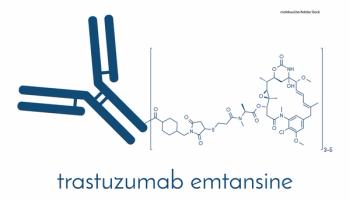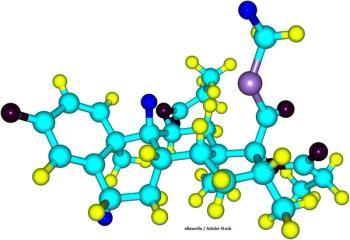
Could something as simple as synchronizing medicine refills at the pharmacy help improve survival in patients with breast cancer using endocrine therapy?

Your AI-Trained Oncology Knowledge Connection!


Could something as simple as synchronizing medicine refills at the pharmacy help improve survival in patients with breast cancer using endocrine therapy?

The new phase II LORELEI trial tested whether the PI3K inhibitor taselisib could improve response rates when added to letrozole in the neoadjuvant setting.

A new phase 1a/b study examined a total of 49 patients with solid tumors, including 34 with ovarian, fallopian tube, or primary peritoneal cancer, treated with a combination of the PARP 1/2 inhibitor pamiparib and the anti-PD-1 monoclonal antibody tislelizumab in several dose escalation cohorts.

Using two validation methods, researchers found that a simple biomarker panel may have strong predictive ability for detecting ovarian cancer.

A new analysis looked at how dose interruptions or reductions of ado-trastuzumab emtansine in the treatment of advanced HER2-positive breast cancer impacted long-term survival outcomes.

The U.S. Preventive Services Task Force released a new review of the benefits and harms of imaging-based screening for pancreatic cancer.

A combination of durvalumab and tremelimumab was tested on patients with metastatic pancreatic ductal adenocarcinoma.

Researchers looked at data from the Surveillance, Epidemiology, and End Results database to see if there has been any increase in the use of active surveillance or watchful waiting when it comes to low-risk prostate cancer.

The study compared PET/CT tracers over 18F-fluciclovine when it comes to the localization of biochemical recurrence of prostate cancer following radical prostatectomy.

A phase III trial found bevacizumab and pemetrexed were effective as a maintenance therapy, but researchers do not recommend it to treat non–small-cell lung cancer.

A phase III trial tested trastuzumab emtansine (T-DM1) with or without pertuzumab in patients with HER2-positive metastatic breast cancer.

Researchers looked at the characteristics of breast cancer found in patients under 40 years old.

Researchers tried using deep machine learning to anticipate disease outcomes and progression in patients with lung cancer.

The study tested whether patients with early breast cancer could benefit from adding olaparib to paclitaxel.

Researchers compared invasive disease-free survival rates in patients with breast cancer who took nanoparticle albumin-bound (NAB)-paclitaxel compared with those who took solvent-based (sb)-paclitaxel.

A new study looked at the link between levels of lactobacilli species found in the cervicovaginal microbiome and the presence or risk of ovarian cancer.

Researchers examined the results of ribociclib and letrozole as a treatment for patients with estrogen receptor-positive ovarian cancer and endometrial cancer.

A trial presented at ASCO 2019 found HER2 heterogenity can impact response rates to some treatments in HER2-positive breast cancer patients.

Researchers examined the germline DNA of Hispanic women with BRCA-negative breast cancer to pinpoint pathogenic variants.

Patients responded relatively well to the phase I trial testing a new treatment for several malignancies, including gastric and gastroesophageal junction adenocarcinomas.

A new study found an upward trend over the last 12 years of cases of gastrointestinal cancer in young patients in Latin America.

A new study examined whether stereotactic body radiotherapy prior to pembrolizumab improved response rate in lung cancer patients.

A new analysis suggests more people may benefit from more inclusive lung cancer screening guidelines.

Researchers tested the novel antibody-drug conjugate trastuzumab duocarmazine in patients with heavily pretreated HER2-expressing metastatic cancers, including breast cancer.

Novel research suggests that using a nano-molecularly imprinted polymer may offer a unique and effective way to treat HER2+ breast cancer.

A new study used two patient-reported measures of sexual function following radical prostatectomy to assess sexual interest and satisfaction in men with prostate cancer.

Researchers compared several glucocorticoid regimens, given in combination with abiraterone acetate, for metastatic castration-resistant prostate cancer.

ASCO has updated its endorsement of a guideline regarding adjuvant systemic therapy decisions for early-stage operable breast cancer.

The FaMRIsc trial was designed to compare MRI and mammography screening in women with familial risk but no known specific driver mutation.

After more than 7 years of follow-up, the phase III PHARE trial failed to show that 6 months of adjuvant trastuzumab therapy was noninferior to 12 months in patients with HER2+ early breast cancer.